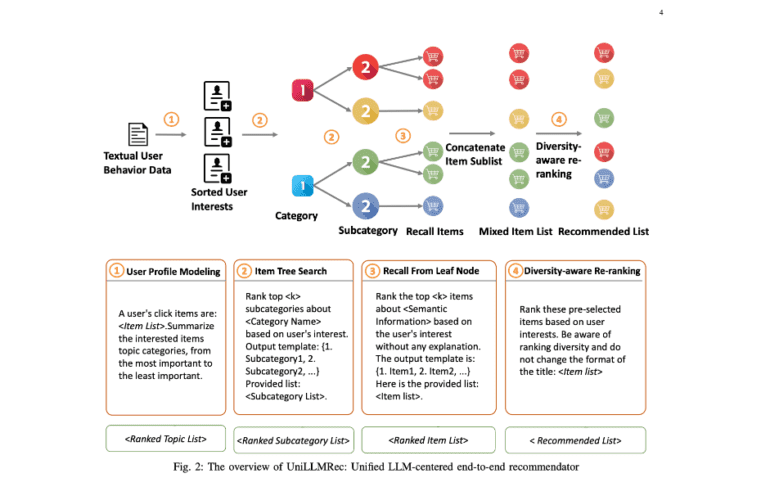- UniLLMRec redefines recommendation systems by leveraging Large Language Models (LLMs) for multi-stage tasks.
- It offers a streamlined approach without extensive training, outperforming conventional models like GPT-4.
- A unique tree-based recall strategy optimizes the handling of large-scale item inventories.
- UniLLMRec enhances the diversity of recommendations compared to previous versions.
- Its performance signifies a paradigm shift in recommendation frameworks.
Main AI News:
The landscape of recommender systems is evolving rapidly, driven by the insatiable demand for personalized user experiences. Traditionally, these systems have operated through sequential pipelines, laboriously trained on vast datasets to predict user preferences. However, scalability and adaptability to new domains have remained persistent challenges. Enter Large Language Models (LLMs), such as ChatGPT and Claude, heralding a new era of recommendation frameworks with their unparalleled generalized capabilities.
In a recent breakthrough, researchers at the City University of Hong Kong and Huawei Noah’s Ark Lab have introduced UniLLMRec, a groundbreaking framework designed to revolutionize recommendation tasks. Unlike its predecessors, UniLLMRec leverages the inherent zero-shot capabilities of LLMs, eliminating the need for extensive training or fine-tuning. This innovative approach not only streamlines the recommendation process but also enhances resource efficiency, paving the way for scalable implementations across diverse contexts.
One of the key strengths of UniLLMRec lies in its ability to seamlessly execute multiple stages of recommendation tasks, including recall, ranking, and re-ranking, within a unified end-to-end framework. This holistic approach not only maximizes the utilization of LLMs’ potent capabilities but also ensures a comprehensive coverage of recommendation scenarios.
To address the challenge of presenting large-scale item sets to LLMs in natural language format, researchers have devised a unique tree-based recall strategy. By organizing items based on semantic attributes such as categories, subcategories, and keywords, UniLLMRec constructs a manageable hierarchy, significantly optimizing the recall process. This strategic approach stands in stark contrast to traditional methods, offering a more efficient and effective solution for handling extensive item inventories.
The performance of UniLLMRec has been nothing short of remarkable. Both UniLLMRec (GPT-3.5) and UniLLMRec (GPT-4) have demonstrated competitive performance compared to conventional recommendation models, without the need for extensive training. Notably, UniLLMRec (GPT-4) exhibits superior performance, thanks to its enhanced semantic understanding and language processing capabilities. These advancements enable UniLLMRec (GPT-4) to leverage project trees effectively, further enhancing the recommendation process.
Conclusion:
UniLLMRec’s emergence signifies a transformative shift in the recommendation system landscape. Its ability to harness the power of LLMs for multi-stage tasks, coupled with efficient handling of large-scale item inventories, heralds a new era of personalized recommendations. Businesses must adapt to this paradigm shift by embracing innovative frameworks like UniLLMRec to stay competitive in delivering tailored user experiences.

